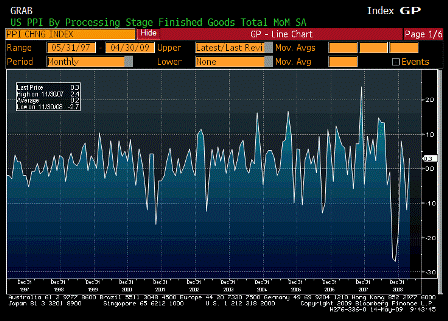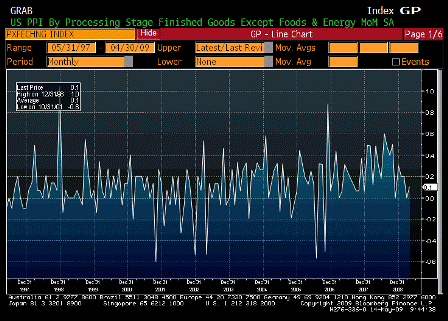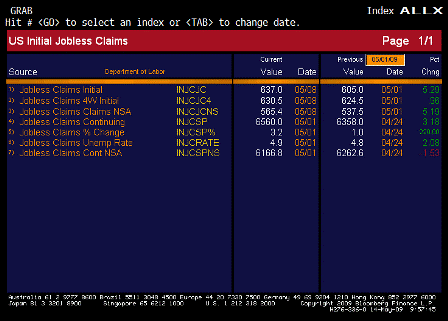Power Point I did for a conference discussion.
Financial Architecture Fundamentals
[top]

Yes, he’s got that part very right!!!
> On Mon, May 25, 2009 at 11:06 PM, Roger wrote:
>
> Federal Reserve Vice Chairman Donald Kohn:
>
> Interactions between Monetary and Fiscal Policy in the Current Situation
>
> [I]n the current weak economic environment, a fiscal expansion may be much more
> effective in providing a sustained boost to economic activity.
> Doesn’t say anything about when. Looks like it’s already too late to forestall a pileup.
>
[top]
From Jim Sturgeon
I’ll put in my two cents. The crooks should be convicted as a regular part of the legal system and examples set to deter future attempts. However, the acquisitive heart and I expect the felonious one, beats about the same from generation to generation (to paraphrase JKG the elder). It’s the institutions that change. We should have a way of dealing with crooks as a matter of institutional (no pun) policy. That much it seems goes without saying, although it seems to be rather more difficult to do than it should.
The most recent economic crisis, triggered by a rapid run-up in the nominal (money) price of various assets, is a more difficult institutional adjustment. Warren is correct that whatever real assets were created as we ran up the money price of debt and other monetary instruments are still in place. And whatever scientific/technological knowledge was created is still present and available for use. We are not now dumber than we were in 2000 or 2005. What has been lost is the balance sheet value of some (probably many) wealth holders. But of course if this was never a reflection of the real value of the assets then it is not so much a loss as a readjustment. People feel poorer because they once felt richer; buoyed by the fool’s gold in their portfolio. Feeling poorer, they now pull in on the reins of their consumption with all the well known results. Agreed there is a need for new rules and the enforcement of both old and new ones so as to control and regulate the financial sector. I also think we would benefit by reducing the strength of that sectors siren’s song that lures so many able minded to its call.
There is a relationship between the financial crises and the real economy, but it is of our making. By this I mean we have put in place a system of rules and policies by which the pecuniary forces in the economy animate or arrest the real forces. This frequently contributes to an already poorly functioning labor sector (market). What would help is to readjust this relationship with an eye toward lessening the impact on the real sector due to the exuberance (irrational or otherwise) in the financial sector. This is a matter of policy, law and regulatory changes necessary to adjust the institutional controls. The first and most obvious one is the labor market. The Full Employment Act of 2009 should be written and passed with an ELR provision (build a high speed rail system for openers and then I’ll add about 50 other obvious projects that would build real wealth in the US). This would significantly dampen the effect of the financial sector on the labor market and bring some stabilization to aggregate demand. Economists and others ought to give at least as much attention to the labor market and real sector as they have to the financial sector.
I don’t know if the above is what Warren has in mind when he says it is the response wherein the problem lies, but it seems to me the response so far is mostly framed with the same logic and played with most of the same players that have helped us misunderstand the relationship between finance and production.
[top]
> On Fri, May 22, 2009 at 8:52 AM, Michael Pede
>
> Singh May Set Record in India Asset Sales After Election Victory
>
Asset sales are deflationary.
>
> Taiwan’s Unemployment Rate Climbs to Record 5.77%
>
> Vietnam’s Central Bank Keeps Key Rate Unchanged at 7%
>
> Philippines Can Meet 2009 GDP Growth Target, Central Bank Says
>
> Indonesia Says Recovery in India, China to Add to GDP Growth
>
[top]
This selling of land is a directly deflationary/contractionary policy, and all because they think the government needs the funds.
Japan’s MOF land sales faltering
May 17 (Nikkei) — The Ministry of Finance is having trouble selling public land, even in metropolitan Tokyo, amid deterioration of Japan’s real estate market in the wake of the global financial crisis.
Market sluggishness is complicating MOF plans to raise funds for fiscal rehabilitation through sale of such land, including properties acquired as in-kind tax payments, with a series of auctions drawing no bidders.
Last December, the ministry planned to sell a huge parcel of 7.7 hectares in a coastal area of Chiba. Some condominium developers had expressed interest in the property during a pre-auction briefing.
But the MOF, which manages public land, called off the auction at the last moment, realizing that no bid would be made.
The Chiba lot holds some 1,300 abandoned apartments which previously housed government workers, but have remained vacant since March 2006.
As recently as 2007, real estate developers flocked to build condos on available land in a competitive wave extending to Chiba. At that time, the vast coastal property, a rare offering, could have sold “on the spot,” said an official involved in the canceled auction.
Government-own plots often sell well because their titles are usually free of unsettled claims. This is especially the case in big cities and their surrounding areas, which contain active real estate markets.
But there remains a scarcity of buyers because the global economic downturn has forced many financial institutions to curtail financing of real estate deals.
In recent MOF auctions, the ratio of successful offers in Tokyo’s 23 wards plunged to just above 50% in the second half of fiscal 2007 from 100% in the first half. And the ratio fell to nearly 30% in the first half of fiscal 2008 and 24% in the second half.
A plan worked out by the ministry in 2007 envisions raising 2.1 trillion yen by the end of fiscal 2015 through the sale of public assets, such as vacant land like the lot in coastal Chiba. The proceeds would be used to finance fiscal rehabilitation.
But a substantial delay in implementation appears unavoidable due to the weakness of the property market.
Private-sector auctions often resort to “bulk sales” to stimulate demand for unpopular parcels of land by combining them with lots expected to draw strong demand. The ministry does not have this option, as government-owned lots must be sold at “fair prices” under the public finance law.
Another reason for the difficulty in attracting buyers is that the ministry is eager for higher-priced deals and often “lacks flexibility,” says a real-estate appraiser.
Prolonged vacancies of public land may not only depress the local real estate market, but also cause security problems in some cases. In addition, the government’s cost of managing unused properties continues to escalate.
When an advisory panel to the finance minister convened in late February to discuss the sale of public land, MOF officials complained they are caught in a catch-22 — raising sorely needed funds through property sales is a thorny process amid real estate market conditions that continue to deteriorate.
(The Nikkei May 15 morning edition)
[top]

| Survey | 0.2% |
| Actual | 0.3% |
| Prior | -1.2% |
| Revised | n/a |
Karim writes:
PPI

| Survey | -3.7% |
| Actual | -3.7% |
| Prior | -3.5% |
| Revised | n/a |

| Survey | 0.1% |
| Actual | 0.1% |
| Prior | 0.0% |
| Revised | n/a |

| Survey | 3.4% |
| Actual | 3.4% |
| Prior | 3.8% |
| Revised | n/a |

| Survey | 610K |
| Actual | 637K |
| Prior | 601K |
| Revised | 605K |
Karim writes:

| Survey | 6400K |
| Actual | 6560K |
| Prior | 6351K |
| Revised | 6358K |

[top]
(email exchange)
>
> On Tue, May 12, 2009 at 10:35 AM, wrote:
>
> We are talking trillions of dollars from our pocket…
>
The Fed is lending to its member banks. That is the same as the banks taking in deposits insured by the FDIC. Banks specific loans are only seen by regulators as a matter of public purpose.
Do you want every loan by every bank revealed? If so, lobby congress, as the majority in congress doesn’t want that.
Your beef is with congress, not the Fed.
Also, loans to member banks are not ‘dollars from our pocket’ unless they aren’t repayable, and the regulators monitor banks for capital compliance and they’ve done an ok job so far in that regard. Relatively few FDIC losses given the magnitude of the slowdown.
>
> Where is accountability for keeping the dead alive?
>
Funding banks is not keeping the dead alive. All banks are always publicly funded via FDIC insured deposits. So happens the Fed is offering funds cheaper and for longer term than the FDIC, so it’s getting the business.
[top]
(email exchange)
>
> On Tue, May 12, 2009 at 11:22 AM, J A Kregel wrote:
>
> And you can add to this the undeclared policy (confirmed to me last week) that
> Chinese reserve diversification to hedge dollar exposure will be primarily in
> stockpiling natural resources, not currency diversification
>
[top]
Thanks!
Another example of politicians using the TARP card to influence the bankruptcy process. Banks may think twice before they provide their next DIP. If nothing else, the cost of this financing will increase. Which I believe is counter to what said politicians would like to see happening.
Hartmarx- A Harbinger of Things to Come
by Rodney Johnson
May 9 (HS Dent) — Hartmarx, the clothier who’s recent fame is making suits warn by President Obama, filed for bankruptcy protection in late January. Wells Fargo supplied Debtor in Possession Financing (DIP) while the company reorganized. Three bidders have emerged: two of the bidders are interested in keeping the operation going, the third would liquidate the company. When employees got wind of the third bid, they rallied against Wells Fargo, assailing the bank and calling congressmen, as reported by Progress Illinois:
This news of a potential liquidiation caused workers, union leaders, and members of Congress to spring into action to aid the company, which employs 3,000 people nationwide, including 1,000 in Illinois. Rep. Phil Hare, who spent 13 years as a Hartmarx employee, described himself as “livid†at the bank, which accepted $25 billion in federal bailout funds. He went on to enlist the help of Rep. Barney Frank (D-MA) and Sen. Chuck Schumer (D-NY). Rep. Jan Schakowsky, whose great-aunt found a job with Hartmarx after emigrating from Russia, called Wells Fargo CEO John Strumpf and urged him to keep the company running. Illinois Treasurer Alexi Giannoulias, meanwhile, sent a letter to Strumpf threatening to sever the state’s business with the bank if Hartmarx was ultimately liquidated.
This is not isolated. This is not about Chrysler, GM, and tens of thousands of workers and the ability of the United State to mass produce heavy vehicles as a point of national security and safety. This is a company that makes clothing, who through the power of employees, not owners, is bringing pressure on a bank through political paths because of TARP funding. A year ago this would have been seen as a bizarre episode. Today it is an indication of where we are headed, as the recently silenced critics of the Chrysler deal know all too well.
[top]